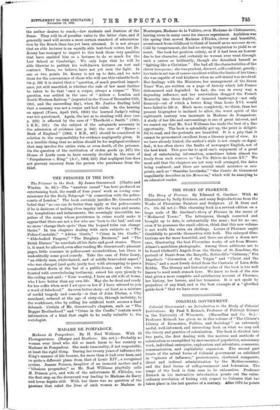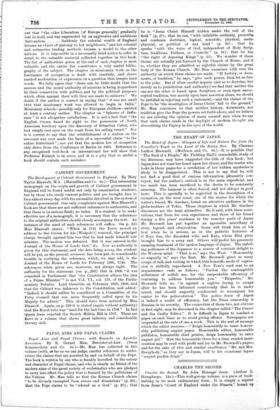COLONIAL GOVERNMENT.
Colonial Government : an Introduction to the Study of Colonial Institutions. By Paul S. Reinsch, Professor of Political Science in the University of Wisconsin. (Macmillan and Co. 6s.)— Professor Reinsch has given us in this volume of "The Citizen's Library of Economics, Politics, and Sociology" an extremely useful, well-informed, and interesting book on what we may call the theory and practice of colonisation. The book is divided into two parts, the first dealing with the motives and methods of colonisation as exemplified by movements of population, missionary work, individual enterprise, exploration and adventure, commerce, communication, and capitalistic expansion. The second part treats of the actual forms of Colonial government as exhibited in "spheres of influence," protectorates, chartered companies, direct and indirect administration by the Mother-country, and the final forms of self-government and federation. The range of the book is thus seen to be exhaustive. Professor Reirsch in his instructive introduction points out the extra- ordinary revolution of feeling with respect to Colonies that has taken place in the last quarter of a century. After 1870 he points
out that "the older Liberalism [of Europe generally] gradually lost its hold, and was superseded by an aggressive and ambitions
Nationalism Suddenly the colonial wealth of England became an object of jealousy to her neighbours," and her colonial and submarine trading, methods became a model to the other nations. It is impossible in a necessarily brief notice to refer in detail to the valuable material collected together in this book. The list of authorities given at the end of each chapter is most valuable, and the entire list constitutes a very useful biblio- graphy of the subject. The chapter on missionary work as the forerunner of occupation is dealt with carefully, and shows marked moderation of expression on a question that tempts hard words. We fully agree that " there can be little doubt that the success and the moral authority of missions is being jeopardized by their connection with politics, and by the political purposes which, often against their will, they are made to subserve." We doubt if the author is correct in saying that " it was not until 1813 that missionary work was allowed to begin in India." Missionary schools—possibly only for European children—existed at least a century earlier. The chapter on " Spheres of Influ- ence" is not altogether satisfactory. It is not a fact that "the English Crown based its right to the possession of North American territory upon the discovery of Sebastian Cabot, who had simply cast eyes on the coast from his sailing vessel." Nor is it correct to say that the establishment of a station on the sea-coast was ever made the basis of a successful claim "to the entire hinterland "; nor yet that the modern law of occupation only dates from the Conference of Berlin in 1885. Reference to any recognised text-book on international law will show that Professor Reinech is in error, and it is a pity that so useful a book should contain such mistakes.























































 Previous page
Previous page